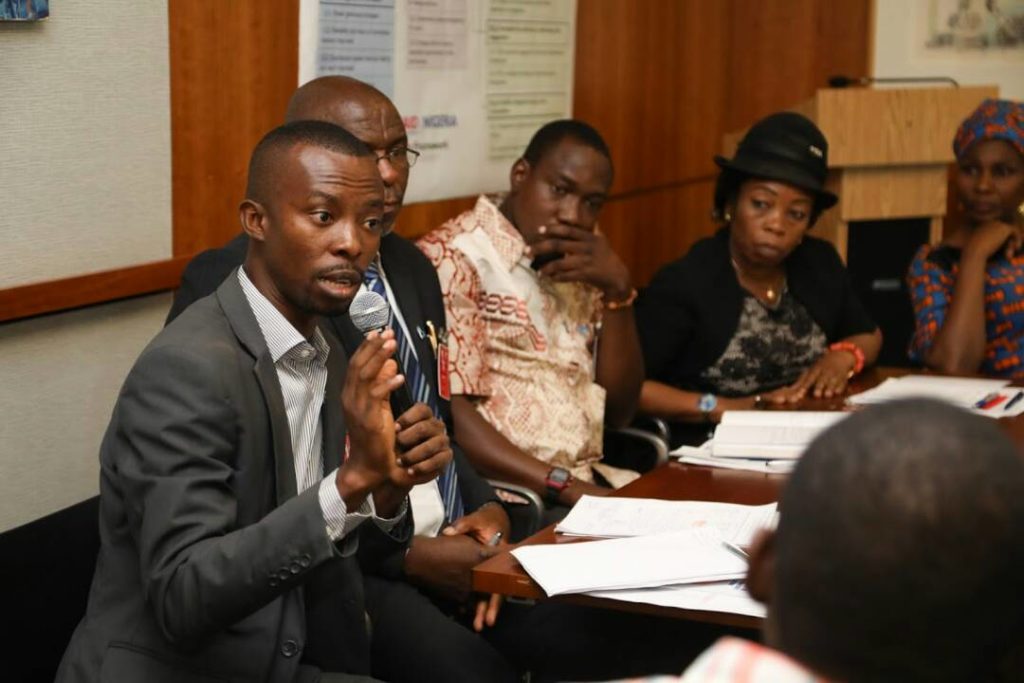Devatop Centre for Africa Development Partners U. S Embassy on Anti-Trafficking

 The United States Senate designated January as National Human Trafficking Awareness Month. National Human Trafficking Awareness Month is a period to promote awareness and actions against Human Trafficking in the Country and around the world. It seeks to end this slavery, return rights to individuals and make the world a safer place for all inhabitants. This is also a time to get private sectors, Individuals, Religious Groups, Organizations, and Government involved in combating and preventing Human Trafficking. An estimated 27 million people are victims of human trafficking globally. They are bought and sold into prostitution, labor exploitation and child pornography. For years, human trafficking has continued to thrive in shadow and in the silence of others. 80% of the victims are young people between the ages of 6 and 24 years.
The United States Senate designated January as National Human Trafficking Awareness Month. National Human Trafficking Awareness Month is a period to promote awareness and actions against Human Trafficking in the Country and around the world. It seeks to end this slavery, return rights to individuals and make the world a safer place for all inhabitants. This is also a time to get private sectors, Individuals, Religious Groups, Organizations, and Government involved in combating and preventing Human Trafficking. An estimated 27 million people are victims of human trafficking globally. They are bought and sold into prostitution, labor exploitation and child pornography. For years, human trafficking has continued to thrive in shadow and in the silence of others. 80% of the victims are young people between the ages of 6 and 24 years.
Nigeria is a source, destination and transit of people trafficked for sexual and labor exploitation. Also, there has been high rise in illegal migration of Nigerian youth to foreign countries, which has led to death of hundreds in Libya, Mediterranean Sea, and deserts. According to Global Slavery Index, there are 875,500 victims of human trafficking in Nigeria. Also, thousands of Nigerian youth have died as a result of irregular migration and smuggling while crossing Mediterranean Sea, desert or dangerous roads. There is urgent need for everyone to take actions against this inhumane act.

To commemorate this year’s 2018 National Human Trafficking Awareness Month, Devatop Centre for Africa Development in partnership with American Center (AC), U.S Embassy Abuja hosted a one-day interactive Discussion on 30th Jan, with the theme: “Fostering Action Against Human Trafficking and Irregular Migration” for CSOs, Youth, Educators, Religious Leaders, Law Enforcement Officers, and interested individuals.
Discussants at the event include:
- Orakwue Arinze (Director of Public Enlightenment, National Agency for Prohibition of Trafficking in Persons)
- Joseph Osuigwe (Director, Devatop Centre for Africa Development)
- Kolawole Olatosimi, Coordinator, NACTAL-North Central
- Ngozi Ikenga, Chairperson, International Federation of Women Lawyers (FIDA-Abuja Chapter)
- Mrs Imaobong Ladipo-Sanusi, Executive Director, Women Trafficking and Child Labour Eradication Foundation (WOTCLEF)

Interactive Discussion
Mr. Joseph Osuigwe, the Executive Director of www.devatop.org spoke briefly about Human Trafficking. Joseph cited that according to 2016 Global Slavery Index, there are over 875, 500 Nigerians who are victims of human trafficking overtime. According to him, “Every year, 32 billion dollars is generated from the exploitation of 27 million victims globally. And NewsMax stated that 30, 000 victims of human trafficking die every year as a result of torture, hunger, and disease. He explained, “Devatop Centre for Africa Development is currently working on developing a mobile application known as TALKAM which can be used to report incidences or cases of human trafficking and other human rights abuses. TALKAM will increase reportage of human trafficking in Nigeria”
The Director-General of National Agency for Prohibition of Trafficking in Persons (NAPTIP), was represented by Mr. Arinze Orakwe buttressed that people have become vulnerable thereby making them gullible just to make ends meet. He went on to differentiate between illegal/irregular migrations and human trafficking. According to him, an illegal migrant has no travel document or paper work, no permission or provision made for the migrant to travel and live in a country.
Bar. Ngozi Ikenga, chairperson of International Federation of Women Lawyers (FIDA-Abuja Chapter) reminded the participants that some of the trafficked victims genuinely think they are going for greener pastures not knowing they are being trafficked.
Mr. Kolawole pointed out that human trafficking is caused by two factors which are the pull and push factor. He said that lack of social security and moral standard in the country are among the causes of human trafficking.
Mrs. Imaobong Ladipo Sanusi blamed the cause of human trafficking on the break down in moral system and also clergies who stand on the pulpit encouraging people to go abroad.
Also, all the discussants spoke emphatically on the need for everyone to take action against human trafficking. They highlighted that some of the actions citizens can take include: observing and reporting human trafficking in their communities, educating young people, volunteering with anti-human trafficking organizations, providing support for anti-human trafficking projects, and creating awareness.

Devatop Centre for Africa Development organized the interactive discussion to suggest solutions and to stimulate participants to take pragmatic steps to tackle human trafficking and irregular migration.
To learn more about Human Trafficking in Nigeria, visit www.devatop.org
By Godsmercy Maduka
